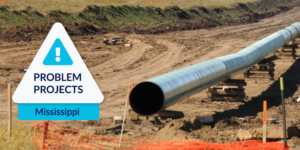
With eyes around the country focused on the fate of pipeline projects in North America, a project in Mississippi is turning heads as a dispute over Gulf South Pipeline Company’s Black Creek Compressor Station — reportedly leading to payment issues for 17 subcontractors and suppliers.
An October 6, 2021, complaint filed in US District Court by Holloman Corporation — general contractor for the Black Creek Compressor Station — claims that C-4 Construction, LLC failed to pay for approximately $1.4 million in materials, labor, equipment, services, and other bills owed to companies working on the Black Creek Compressor Station.
According to their own website, C-4 focuses on site preparation, offering additional services in fence construction, road construction and preparation, ranch services, and land development.
Holloman’s complaint added that even though the company was not terminated until July 2021, “C-4 stopped paying its subcontractors and/or suppliers on the Black Creek Project in March or April 2021.”
Despite this, allegedly, C-4 submitted waivers claiming that it had paid for everything needed on the project — effectively keeping Holloman out of the loop until at least four subcontractors asserted claims on the project’s labor and material payment bond.
The complaint notes an example of subcontractor Vulcan Construction Materials, LLC, which provided C-4 with road base, limestone, and rip rap. Despite the materials being accepted and used on the project, Vulcan Construction went without payment and had to make two claims against the payment bond for a total of $519,411.57. In this case, Holloman notes that it had to resolve Vulcan’s claims on the payment bond.
Beyond just the Black Creek Compressor Station, C-4 conducted work for Holloman on the Gulf South Pipeline’s Marksville Compressor Station Project, and allegedly failed to pay one of its suppliers for materials delivered as part of the original scope of work, leading Holloman to have to pay the supplier itself.
Beyond just non-payment, C-4 allegedly failed to complete its contractual obligations on the project
The complaint further alleged that C-4’s work was almost immediately behind schedule, stating that “After numerous attempts, C-4 was unable to supply work of the quality or quantity to prosecute the work in accordance with their contractual obligations and work schedule” — adding that the company couldn’t meet the April 1, 2021, milestone agreed upon in the contract and was “approximately two months behind schedule.”
Schedule Delays: How to Assess & Reduce Impact in Construction
The complaint additionally claims that the work C-4 performed on the project was “heavily insufficient,” with Holloman maintaining that the company “[demonstrated] an inability to supply sufficient workers, materials, and equipment of the quality and quantity necessary to prosecute work.”
According to Holloman, C-4 failed to utilize the proper equipment during work on both the Black Creek and Marksville compressor projects, noting that “there were multiple cases of operators taking equipment into restricted areas, material used for backfill of the station pad was not in accordance with contract specifications, and the ECDs were not maintained properly or installed in accordance with Pipeline and Hazardous Materials Safety Administration or industry standards.”
Holloman noted that it had to step in and finish work with additional outside supervision after C-4 failed to deliver on its contractual obligations, with the contractor informing C-4 that it would be taking over the remaining scope of the contract’s work on July 8, 2021.
Despite Holloman noting that “time [was] of the essence” on the Black Creek project, it claimed that C-4’s delays and failures held back Holloman’s progress significantly.
C-4 was additionally terminated from the project on July 8, 2021, with Holloman specifying that quality of work, timeliness of work, and “failure to meet its debts for materials, supplies, and services” was cause for the termination.
Pipeline projects have been particularly controversial — and contractors may benefit from approaching them with caution
Though oil pipelines have been major draws for construction in North America, the last number of years have quelled a lot of action surrounding pipeline work as environmental concerns have overtaken economic concerns and political opinion has shifted towards more significant regulation.
Perhaps most notably, the development of the controversial Keystone XL Pipeline was terminated by TC Energy in June 2021 after an executive order from President Joe Biden revoked a necessary construction permit.
Previous Levelset coverage in July 2021 and September 2021 touched on the difficulties faced by smaller pipeline projects, as well, with Texas’ Seahawk Loading Facility coming under significant financial duress due to mechanics lien filings.
Withdrawal from pipeline projects, while much debated, has yet to display a definite impact on the construction industry. The Keystone XL pipeline provided a distinct example of the divisive nature of pipeline construction: Though the US Chamber of Commerce’s Global Energy Institute claimed in January 2021 that the project would support “13,000 Canadian and American workers in the building trades,” a prior report by the Obama administration’s Department of State claimed that the pipeline’s construction would result in “3,900 direct construction jobs if it was built over one year, or 1,950 if the work was spread over two years.”
Environmental concerns will continue to make pipelines a risky business for contractors, even with the largest and most well-known projects. The notable — and heavily controversial — Dakota Access pipeline is still struggling to get off the ground, with the company engaged in a back-and-forth with environmental groups, Native American tribal representatives, and the Biden administration over the pipeline’s necessary permissions.